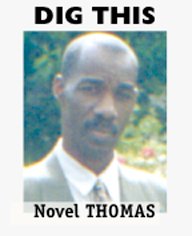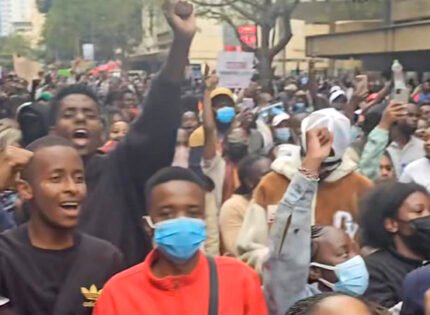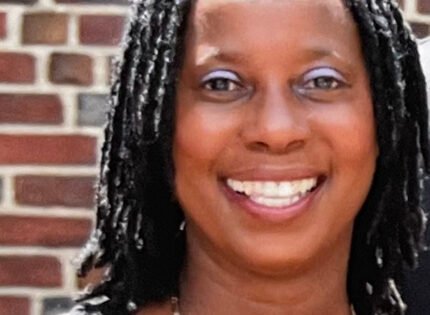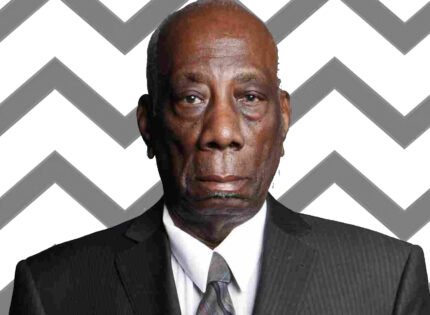 Having discarded the mantle of slavery, the children, grandchildren, great grandchildren and multiple generations (of the slaves) ultimately mustered the courage to demand their freedom…
Having discarded the mantle of slavery, the children, grandchildren, great grandchildren and multiple generations (of the slaves) ultimately mustered the courage to demand their freedom…
And have been de-manding and sacrificing lives ever since — for centuries…
“We want Justice” ad nauseam has become the historic mantra of Af-rican Americans over those multiple generations of civil rights activ-ism.
In fact, that historic and continuous resounding call to action could and should at this point in time be recognized as the de facto Black national/liberation anthem.
Watching multiple news magazines and documentaries over the years on the subject of slavery in this case, I never tire of watching them; they’re always instructive. It’s the story of Black people on the North American continent over centuries and generations.
How can one get tired of an aspect of one’s global history?
I used to see Black people, soldiers of social justice, as well as their allies who genuinely believe in the concept) peacefully marching in the streets of America, and to a lesser extent in Canada, as well as other parts of the world shouting… chanting the mantra, the unofficial Black liberation anthem, in some instances running like hell to avoid being chewed up by vicious German shepherd dogs baring their teeth, some-times biting into Black flesh at the behest of their handlers siccing them on scrambling negroes… (coloured people as we were called back in the day.)
It was a choice of running for cover or, if brave enough, cowering to avoid and numb the pain of the police truncheons or being mauled by their support team, those German shepherds.
Those were the post slavery “black-and-white days” visually and liter-ally speaking. The black and white tv was working overtime in those “heady days of racism,” essentially trying times for “powerless” Black people who were expected to imply “grin and bear it” — the inhuman-ity of not just being America’s generational slaves in these parts, but Europe’s (primarily England’s, France’s, Portugal’s and other gradually decolonizing nations of the African continent and the diaspora’s em-bedded white colonials and practices… essentially sacrificing thou-sands of Black lives trapped in the “yoke” of that racist social con-struct.
Nothing nostalgic about that period in history by any stretch; just try-ing times in the U.S, South Africa and Rhodesia and their apartheid systems all of which have provided much food for thought over genera-tions…
All I could do from a distance was watch those brave men and women put their heads on the proverbial block as they were pummelled by “law and order” forces, often drawing blood in the dehumanizing proc-ess…
The “we want justice” mantra has served Black people in this part of the world where we are seen as “minorities” and treated as such.
There was a sense of “us” the [Black] communities being “lip-serviced” into oblivion by the powers-that-be, promising social change and better days to come.
And I understand some of it barriers… tangible and intangible barriers to overcome.
That was then.
Might now we’re a part of what’s referred to as a cosmopolitan com-munity, but I have a sense that we’re being lip-serviced, promised, pi-geon-holed, marginalized…
Blame those traditional, invisible forces historically working against our collective interests. Not the least of which is that insidious and in-valuable “lack of community cohesion” notion.
In the meantime, with various tangible and intangible forces arrayed against us, we cannot allow ourselves/to be ostracized by tangible and intangible forces.
In his seminal work, Pedagogy of the Oppressed, Brazilian educator Paulo Freire Paulo Freire (1921-1997) is symbiotically addressing peo-ple any and everywhere in the world who have (ever) lived under op-pressive conditions…
In one of his famous quotes he writes:
The oppressed, having internalized the image of the oppressor and adopted his guidelines, are fearful of freedom. It is absolutely essential that the oppressed participate in the revolutionary process with an increasingly critical awareness of their role as subjects of the transformation.
The trust of the people in the leaders reflects the confidence of the leaders in the people.
Washing one’s hands of the conflict between the powerful and the powerless means to side with the powerful, not to be neutral.
At times, I have been criticized by some philosophers of education, who place me in postures that they classify pejoratively as ‘revolutionary.’ But I have had the satisfaction of being invited to work in societies making progressive efforts without wavering. They were changing, and so they called on me.
Manipulation, sloganizing, depositing, regimentation, and prescription cannot be components of revolutionary praxis, precisely because they are the components of the praxis of domination.
At a certain point in their existential experience, the oppressed feel an irresistible attraction to-ward the oppressor and his way of life. Sharing this way of life becomes an overpowering aspi-ration…
“I am an educator who thinks globally,” he concludes.
Get and read it if possible.
So while preparing this a couple days ago I found myself scrolling the radio dial for some interesting conversation and happened upon a local multilingual stationed an in-teresting conversation. The banter between the host and guest was predominantly in French, but it was interesting so I stayed locked in for a long time to extract as much as I possibly could during the discussion.
At a certain point the conversation touched on the issue of policing and I lost something along the way in my mental translation.
In any case, something about Black Lives Matter came up in the conversation. His re-sponse regarding BLM was unflattering… Something about BLM and excrement. Don’t know if it was human or animal. A police, don’t know of which jurisdiction, municipal, provincial or federal.
That man (police officer) wasn’t big on police cameras either. And I immediately con-nected his disfavour with the cop-cam with George Floyd’s killer who is now resting comfortably in jail pending what should be a commensurate (and justified) sentence in a couple months for squeezing the life out of Floyd.
He probably thought it would’ve been easier to asphyxiate Floyd on U.S Memorial Day, 2020, rather than shooting him. Which probably has that particular policeman a little perplexed, thinking he should’ve fixed the victim the old fashioned way — shooting him, probably in the back, as is seemingly becoming the norm in that jungle down the way where shooting people, particularly in the back, has become the norm in the case of Black men.
They’re demonstrating that one cop who didn’t do things the more efficient, old-fashioned police “killing norm…”


![REVENGE OF THE BROTHERHOOD? [Pt. 1]](https://mtlcommunitycontact.com/wp-content/uploads/2021/02/Novel-Banner-1170x700.jpg)













